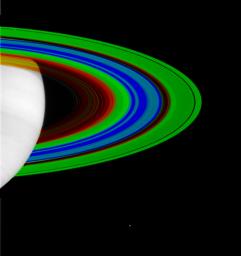The varying temperatures of Saturn's rings are depicted here in this false-color image from the Cassini spacecraft.
This image represents the most detailed look to date at the temperature of Saturn's rings. The image was made from data taken by Cassini's composite infrared spectrometer instrument.
Red represents temperatures of about 110 Kelvin (-261 degrees Fahrenheit), and blue 70 Kelvin (-333 degrees Fahrenheit). Green is equivalent to 90 Kelvin (-298 degrees Fahrenheit). Water freezes at 273 Kelvin (32 degrees Fahrenheit). The spatial resolution of the ring portion of the image is 200 kilometers (124 miles).
The data show that the opaque region of the rings, like the outer A ring (on the far right) and the middle B ring, are cooler, while more transparent sections, like the Cassini Division (in red just inside the A ring) or the inner C ring (shown in yellow and red), are relatively warmer.
The temperature data were taken on July 1, 2004, of the unlit side of the rings. In order to show the full breadth of the rings, a strip of temperature data was mapped onto a picture of the lit side of the rings taken with the Cassini narrow angle camera on May 11, 2004, a little over a month before Saturn orbit insertion. Cassini is too close to the planet and hence no pictures of the unlit side of the rings are available, so the temperature data were mapped onto a picture of the lit side of rings. Saturn is overexposed and pure white in this picture. Saturn's moon Enceladus is visible below the rings, toward the centerThe original picture and caption are available at PIA05410.
The Cassini-Huygens mission is a cooperative project of NASA, the European Space Agency and the Italian Space Agency. The Jet Propulsion Laboratory, a division of the California Institute of Technology in Pasadena, manages the Cassini-Huygens mission for NASA's Science and Mission Directorate, Washington, D.C. The Cassini orbiter was designed, developed and assembled at JPL. The Composite Infrared Spectrometer team is based at NASA's Goddard Space Flight Center, Greenbelt, Md.
For more information about the Cassini-Huygens mission, visit http://saturn.jpl.nasa.gov and the instrument team's home page, http://cirs.gsfc.nasa.gov/.

 Planetary Data System
Planetary Data System












